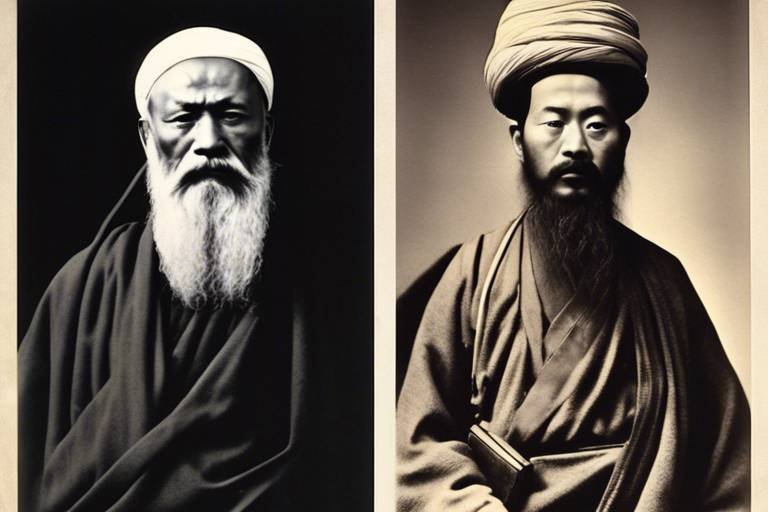Comparing Eastern and Western Philosophies
In a world rich with diverse thoughts and beliefs, the comparison between Eastern and Western philosophies serves as a fascinating exploration of how humans seek to understand existence, morality, and the universe. These two distinct traditions, shaped by their unique cultural and historical contexts, offer contrasting yet sometimes overlapping perspectives that can enrich our understanding of life. Imagine standing at a crossroads, with one path leading to the serene landscapes of Eastern thought—where harmony and interconnectedness reign supreme—and the other to the bustling streets of Western rationalism, where individualism and analytical reasoning drive inquiry. This article aims to delve into the key differences and similarities between these philosophical traditions, examining their approaches to ethics, metaphysics, and the nature of reality.
To fully appreciate the nuances of Eastern and Western philosophies, one must first understand their historical contexts. Eastern philosophies, rooted in ancient traditions from countries like China, India, and Japan, have been influenced by social structures, spiritual practices, and communal values. Conversely, Western philosophies, originating from ancient Greece and evolving through the Renaissance and Enlightenment periods, have been shaped by a quest for knowledge, scientific inquiry, and individual rights. It's akin to comparing two different musical genres; while both can evoke profound emotions, their rhythms and melodies reflect their unique origins and cultural influences.
As we dive deeper into the core beliefs of these philosophical traditions, we find that they offer distinct worldviews. Eastern philosophies often emphasize the interconnectedness of all beings, suggesting that the self is not separate from the universe but rather a part of a greater whole. In contrast, Western philosophies tend to focus on the individual as a distinct entity, navigating a world of choices and responsibilities. This fundamental difference can be likened to viewing a painting: while Eastern thought sees the entire canvas and the interplay of colors, Western thought often zooms in on individual brush strokes and their significance.
In examining the ethical frameworks of these traditions, we uncover contrasting views on morality and the role of the individual in society. Eastern ethics frequently prioritize collective well-being, encouraging individuals to consider the impact of their actions on the community. This perspective fosters a sense of duty and responsibility towards others, promoting harmony and social cohesion. On the other hand, Western ethics often emphasize personal autonomy and individual rights, advocating for justice and fairness based on rational deliberation. This divergence in ethical focus can lead to rich discussions on how best to navigate moral dilemmas in a globalized world.
As we explore metaphysics and the nature of reality, the differences become even more pronounced. Eastern metaphysical views often embrace concepts such as non-duality and the cyclical nature of existence, suggesting that life is an ongoing process of transformation. This holistic understanding fosters a profound appreciation for the interconnectedness of all things. In contrast, Western metaphysical views typically emphasize dualism, the separation of mind and body, and linear notions of time, influencing scientific and philosophical discourse throughout history. It's like comparing two lenses through which we view the universe; each offers unique insights, yet they can also complement one another in the quest for understanding.
In conclusion, the comparison of Eastern and Western philosophies reveals a rich tapestry of thought that continues to influence contemporary discussions in various fields. By integrating these philosophies, we can foster a deeper understanding of complex issues, encouraging cross-cultural dialogue and the exploration of diverse perspectives. As we navigate the challenges of today's world, the relevance of both traditions is evident in discussions surrounding ethics, environmentalism, and global citizenship. Ultimately, embracing the wisdom of both Eastern and Western philosophies can lead to a more holistic approach to understanding ourselves and our place in the universe.
- What are the main differences between Eastern and Western philosophies? Eastern philosophies often emphasize collectivism and interconnectedness, while Western philosophies prioritize individualism and rationality.
- How do Eastern and Western philosophies approach ethics? Eastern ethics focus on communal well-being and social harmony, whereas Western ethics highlight personal rights and justice.
- Can Eastern and Western philosophies be integrated? Yes, integrating both can lead to a richer understanding of complex issues and encourage cross-cultural dialogue.
- What role does historical context play in shaping these philosophies? Historical context influences the development of philosophical traditions, shaping their core beliefs and ethical frameworks.

Historical Context
Understanding the historical background of Eastern and Western philosophies is crucial for appreciating their development and influences. These two philosophical traditions did not emerge in a vacuum; rather, they were shaped by the unique cultural, social, and political contexts of their respective regions. In the East, philosophies like Confucianism, Taoism, and Buddhism arose in societies that valued harmony, community, and spiritual enlightenment. Meanwhile, in the West, thinkers such as Socrates, Plato, and Aristotle laid the groundwork for a tradition that emphasized reason, individualism, and empirical inquiry.
The historical journey of these philosophies can be viewed as a tapestry woven with threads of various influences. For instance, the rise of Confucianism in China during the 5th century BCE was a response to societal turmoil, focusing on moral integrity and social harmony. In contrast, the Western philosophical tradition began in ancient Greece, where philosophical inquiry was often tied to politics and the quest for knowledge about the natural world.
Moreover, the cultural exchanges along the Silk Road facilitated the sharing of ideas between the East and West, albeit slowly. These exchanges led to a gradual blending of thoughts, where Eastern philosophies started to influence Western thinkers and vice versa. The Renaissance period marked a significant turning point, as Western scholars began to explore Eastern texts, leading to a richer, more integrated philosophical discourse.
In summary, the historical context of Eastern and Western philosophies is not just a backdrop; it is a dynamic interplay of ideas, cultures, and values. The evolution of these traditions reflects the societies from which they originated, and understanding this context allows us to appreciate their complexities and nuances. As we delve deeper into their core beliefs, we can see how these historical roots continue to shape contemporary thought and ethical frameworks.

Core Beliefs
When we dive into the of Eastern and Western philosophies, we uncover a fascinating tapestry woven from different threads of thought, culture, and history. Each tradition offers its own lens through which to view the world, shaping our understanding of self, existence, and the universe. At first glance, it might seem like these philosophies are worlds apart, but a closer look reveals that they often grapple with similar questions, albeit from different angles.
In the Eastern tradition, the concept of the self is often viewed as interconnected with the universe. Think of it like a drop of water in the ocean; while it has its own identity, it is also part of something much larger. This perspective is deeply rooted in philosophies such as Confucianism, Taoism, and Buddhism, which emphasize harmony, balance, and the interconnectedness of all beings. For instance, in Buddhism, the idea of anatta, or non-self, suggests that clinging to a fixed identity can lead to suffering. Instead, embracing the fluidity of existence allows for a more profound understanding of life.
In contrast, Western philosophies often prioritize the individual. The self is seen as a distinct entity, capable of rational thought and moral decision-making. Think of the Western approach as a solitary tree in a vast forest, standing tall and proud, asserting its uniqueness. Philosophers like Socrates and Plato championed the idea of individual reason as the path to knowledge, advocating for the pursuit of truth through critical thinking and dialogue. This emphasis on individualism has shaped many aspects of Western culture, including politics, ethics, and education.
Another significant difference lies in how these traditions view the universe. Eastern philosophies often embrace a cyclical understanding of existence. Imagine life as a never-ending circle, where birth, death, and rebirth are part of an eternal dance. This cyclical perspective promotes a sense of continuity and connection to nature, encouraging individuals to live in harmony with their surroundings. In contrast, Western thought typically sees the universe in linear terms, where time moves from past to present to future. This linear view influences everything from scientific inquiry to ethical frameworks, as it suggests a clear progression and evolution of ideas.
Despite these differences, there are some striking similarities between the two traditions. Both Eastern and Western philosophies grapple with questions of existence and reality. They seek to understand the nature of being, the purpose of life, and the essence of truth. For example, while Eastern philosophies may focus on the interconnectedness of all things, Western philosophies often explore the nature of the individual’s role within that larger framework. This interplay between individual and collective perspectives enriches both traditions, allowing for a more nuanced understanding of the human experience.
In summary, the core beliefs of Eastern and Western philosophies provide us with a diverse array of perspectives on self, existence, and the universe. While they may differ in their approaches, both traditions offer invaluable insights that can guide us in our quest for understanding. As we navigate the complexities of life, embracing these diverse viewpoints can foster a richer, more inclusive dialogue about our place in the cosmos.
- What are the main differences between Eastern and Western philosophies?
Eastern philosophies focus on interconnectedness and harmony, while Western philosophies emphasize individualism and rationality. - How do Eastern and Western philosophies approach ethics?
Eastern ethics often prioritize collective well-being, whereas Western ethics emphasize individual rights and autonomy. - Can Eastern and Western philosophies coexist?
Yes, integrating insights from both traditions can lead to a more comprehensive understanding of complex issues. - What role does culture play in shaping philosophical beliefs?
Cultural and social factors significantly influence philosophical perspectives, leading to diverse interpretations of concepts like self and existence.

Eastern Philosophical Traditions
When we dive into the rich tapestry of , we uncover a world that is profoundly different yet intriguingly similar to Western thought. Eastern philosophies, including Confucianism, Taoism, and Buddhism, are deeply rooted in the concepts of harmony, balance, and interconnectedness. These traditions offer unique insights into personal and societal ethics, emphasizing the importance of relationships and the collective over the individual.
At the heart of these philosophies lies a focus on understanding the universe not as a collection of isolated entities but as a complex web of relationships. For instance, in Confucianism, the idea of ren (benevolence) is paramount, guiding individuals to act in ways that promote harmony and respect within their families and communities. This approach fosters a sense of duty and responsibility, suggesting that our actions should always consider their impact on others.
Taoism takes a slightly different route, advocating for a life in harmony with the Tao, or the natural order of the universe. This philosophy encourages individuals to embrace simplicity and spontaneity, suggesting that by aligning ourselves with the flow of nature, we can achieve a deeper sense of peace and fulfillment. Imagine trying to swim upstream against a powerful current; it’s exhausting and ultimately futile. Instead, Taoism teaches us to let go and flow with the current, trusting that we will find our way.
On the other hand, Buddhism introduces a transformative perspective on suffering and existence. The Four Noble Truths and the Eightfold Path serve as guiding principles for individuals seeking enlightenment. Buddhism emphasizes the importance of mindfulness and awareness, encouraging practitioners to look within themselves to understand the nature of reality and their place within it. This introspective journey is not just about personal salvation; it also fosters compassion for all living beings, reinforcing the interconnectedness central to Eastern thought.
To better understand these philosophies, let’s break down some of their core tenets:
| Philosophy | Core Focus | Key Concepts |
|---|---|---|
| Confucianism | Moral integrity and social harmony | Ren (benevolence), Li (ritual propriety) |
| Taoism | Living in harmony with the Tao | Wu Wei (non-action), Yin and Yang |
| Buddhism | Understanding suffering and achieving enlightenment | The Four Noble Truths, The Eightfold Path |
In conclusion, Eastern philosophical traditions provide a profound lens through which we can view our lives and the world around us. They invite us to reflect on our connections with others and the universe, urging us to cultivate a sense of harmony and balance in our daily lives. By integrating the teachings of these philosophies, we can enrich our understanding of ethics and existence, paving the way for a more compassionate and interconnected global society.
- What are the main differences between Eastern and Western philosophies? Eastern philosophies focus more on community and interconnectedness, while Western philosophies often emphasize individualism and rationality.
- How do Eastern philosophies view ethics? Eastern ethics typically prioritize collective well-being and harmony, contrasting with the Western focus on individual rights and autonomy.
- Can Eastern and Western philosophies be integrated? Yes, blending these philosophies can lead to a richer understanding of complex issues, fostering cross-cultural dialogue.

Confucianism
Confucianism, founded by the Chinese philosopher Confucius in the 5th century BCE, serves as a cornerstone of Eastern ethical thought. At its core, Confucianism emphasizes the importance of moral integrity, social relationships, and the central role of family in cultivating a harmonious society. The teachings of Confucius are not just philosophical musings; they form a practical guide to living a virtuous life, advocating for values that resonate deeply within East Asian cultures.
One of the key tenets of Confucianism is the concept of Ren, often translated as "benevolence" or "humaneness." This principle encourages individuals to cultivate compassion and empathy towards others. In practice, this means treating others with respect and kindness, fostering a sense of community. Confucius believed that when individuals embody Ren, they contribute to the overall harmony of society. This idea is beautifully encapsulated in the Golden Rule of Confucianism: "Do not do to others what you do not want done to yourself."
Another significant aspect of Confucianism is the emphasis on Li, which refers to the proper conduct, rituals, and social norms that govern interactions within society. Li encompasses everything from everyday manners to the formal ceremonies that reinforce social bonds. By adhering to Li, individuals maintain social order and cultivate respect among one another. Confucius argued that without Li, society would descend into chaos, as people would act solely based on personal desires rather than communal well-being.
Furthermore, Confucianism places a strong emphasis on the importance of education and self-cultivation. Confucius believed that through education, individuals could improve themselves and, by extension, their families and communities. This pursuit of knowledge is not merely for personal gain but is seen as a duty to society. The idea that "learning is a lifelong journey" resonates deeply within Confucian thought, encouraging individuals to seek wisdom throughout their lives.
In modern contexts, Confucianism continues to influence various aspects of life, from family structures to governmental policies. For instance, many East Asian countries still prioritize family loyalty and respect for elders, reflecting Confucian ideals. Additionally, the focus on harmony and community over individualism can be seen in social practices and business ethics across the region.
To summarize, Confucianism offers a rich tapestry of moral guidance that emphasizes the interconnectedness of individuals within their social fabric. By fostering virtues such as Ren and Li, Confucianism not only shapes personal character but also serves as a framework for building a cohesive society. Its teachings remain relevant today, providing insights into how we can navigate the complexities of modern life while maintaining a sense of community and responsibility towards one another.
- What is the main focus of Confucianism? Confucianism primarily focuses on ethical living, moral integrity, and the importance of social relationships.
- How does Confucianism view education? Education is highly valued in Confucianism as a means of self-cultivation and societal improvement.
- What are Ren and Li in Confucianism? Ren refers to benevolence and compassion, while Li pertains to proper conduct and social norms.
- Is Confucianism still relevant today? Yes, Confucianism continues to influence social practices, family structures, and ethical considerations in many East Asian cultures.

Taoism
Taoism, one of the most profound philosophical traditions to emerge from the East, invites us to explore the essence of existence through the lens of harmony and balance. At its core, Taoism teaches us about the Tao, often translated as "the Way." This concept is not merely a path to follow but rather a fundamental principle that underlies the universe. Imagine the Tao as a river—ever-flowing, adapting, and interconnected with everything around it. Just as a river finds its way around obstacles, Taoism encourages individuals to embrace simplicity and spontaneity in their lives, aligning themselves with the natural order.
Central to Taoism is the idea of living in accordance with the Tao, which means recognizing the interconnectedness of all things. This philosophy emphasizes that every action reverberates throughout the universe, much like the ripples created when a stone is tossed into a pond. By understanding this, practitioners strive to cultivate a sense of peace and tranquility within themselves and their surroundings. In a world that often feels chaotic, Taoism offers a refreshing perspective: instead of forcing outcomes, we are encouraged to flow with life, adapting to changes and challenges with grace.
Moreover, Taoism promotes a deep connection to nature, urging individuals to observe and learn from the natural world. Nature is seen as a teacher, revealing profound truths about existence. For instance, consider the way trees grow—each one uniquely shaped by its environment, yet all contributing to the ecosystem's balance. This analogy serves as a reminder that we, too, are shaped by our experiences and surroundings, and finding our place within the larger tapestry of life is essential.
In practical terms, Taoism encourages practices such as meditation, tai chi, and qigong, which help individuals cultivate inner peace and harmony. These practices are not just physical exercises; they are holistic approaches that integrate mind, body, and spirit. Through these disciplines, practitioners learn to quiet their minds, connect with their breath, and become more attuned to the rhythms of nature. This alignment fosters a sense of well-being and a deeper understanding of one's place in the universe.
In summary, Taoism is more than just a philosophy; it's a way of life that advocates for balance, simplicity, and a profound connection to the world around us. By embracing the teachings of the Tao, individuals can navigate their lives with a sense of purpose and tranquility, ultimately contributing to a more harmonious existence for themselves and society as a whole.
- What is the main goal of Taoism?
The primary goal of Taoism is to live in harmony with the Tao, which is the fundamental principle that governs the universe. This involves understanding the interconnectedness of all things and embracing a natural way of living. - How does Taoism view nature?
Taoism views nature as a teacher and an essential part of life. It emphasizes the importance of connecting with the natural world to gain insights and wisdom. - What practices are associated with Taoism?
Common practices in Taoism include meditation, tai chi, and qigong, all of which aim to cultivate inner peace and harmony with the universe.

Western Philosophical Traditions
Western philosophical traditions have long been the bedrock of intellectual thought in Europe and the Americas. From the ancient musings of Socrates to the modern inquiries of Kant, these philosophies delve deep into the nature of existence, ethics, and knowledge. At the heart of Western philosophy lies a strong emphasis on rationality and individualism, which have profoundly shaped our understanding of the world and ourselves. But what does this really mean for us today? Let’s explore some of the pivotal figures and ideas that have defined Western thought.
One of the most influential figures in Western philosophy is Socrates, who is often regarded as the father of Western philosophy. His method of questioning, known as the Socratic method, encourages critical thinking and dialogue. Instead of providing answers, Socrates challenged his students to think for themselves, fostering a culture of inquiry that remains foundational in educational systems today. This approach not only promotes understanding but also emphasizes the importance of self-awareness and ethical living.
Following Socrates, we encounter Plato, his student, who introduced the concept of ideal forms. Plato's allegory of the cave illustrates how humans often perceive reality through a limited lens, suggesting that true knowledge comes from philosophical reasoning. This idea has encouraged generations to seek deeper truths beyond mere appearances, igniting a quest for wisdom that transcends the superficial.
As we move through history, we can't overlook Immanuel Kant, who revolutionized Western philosophy in the 18th century. Kant’s emphasis on autonomy and moral duty laid the groundwork for modern ethical theories. He proposed that morality is rooted in rationality, asserting that individuals must act according to maxims that can be universally applied. This notion of the categorical imperative has sparked debates on moral philosophy, urging us to consider our actions in a broader ethical context.
Moreover, Western philosophy has also been shaped by the Enlightenment, a period that championed reason, science, and skepticism of traditional authority. Thinkers like John Locke and Thomas Hobbes contributed to political philosophy, exploring concepts of government, individual rights, and social contracts. Their ideas have influenced modern democratic systems and continue to resonate in discussions about freedom and governance.
In contrast to Eastern philosophies that often embrace a holistic view of existence, Western traditions tend to adopt a dualistic approach. This dualism, particularly evident in the mind-body distinction, has led to significant advancements in science and technology. However, it has also raised questions about the nature of consciousness and the interconnectedness of all things. As we navigate the complexities of modern life, the dichotomy between mind and body invites us to rethink our relationship with ourselves and the universe.
In summary, Western philosophical traditions offer a rich tapestry of ideas that have shaped human thought and culture. From the Socratic method to Kantian ethics, these philosophies encourage us to engage critically with our beliefs and the world around us. They remind us that, while we may be individuals, our thoughts and actions are deeply interconnected with the broader fabric of society.

Ethics and Morality
When we dive into the world of ethics and morality, we find ourselves navigating through a complex landscape shaped by cultural, historical, and philosophical influences. Eastern and Western philosophies offer contrasting views that reflect their unique worldviews, and these differences have profound implications on how individuals and societies approach moral dilemmas. Have you ever wondered why some cultures prioritize community over individuality? Or why others place such a strong emphasis on personal rights? These questions point to the heart of ethical frameworks in both traditions.
In Eastern philosophies, ethics is often viewed through the lens of collective well-being. This perspective emphasizes the importance of social relationships and the interconnectedness of individuals within a community. For instance, in Confucianism, moral conduct is not just about personal integrity; it also involves fulfilling one's roles and responsibilities towards family and society. This communal approach fosters a sense of duty and harmony, where the actions of individuals are seen as contributing to the greater good. Imagine a tapestry, where each thread represents an individual, and together they create a beautiful, cohesive picture. This is the essence of Eastern ethical thinking.
On the other hand, Western ethical perspectives often revolve around individual rights and autonomy. Think about the philosophers like Kant, who championed the idea that moral actions are grounded in rationality and the capacity for individuals to make choices. In this view, ethics is about personal responsibility and the pursuit of justice. The focus is on the individual’s ability to deliberate and make choices based on reason. This is akin to a solo artist creating a masterpiece; the emphasis is on the individual's vision and expression, rather than a collective effort.
To illustrate the differences further, consider the following table that summarizes key distinctions between Eastern and Western ethical frameworks:
| Aspect | Eastern Ethics | Western Ethics |
|---|---|---|
| Focus | Collective well-being | Individual rights |
| Key Values | Harmony, duty, virtue | Autonomy, justice, reason |
| Decision-Making | Community-oriented | Individual-oriented |
| Moral Framework | Relational | Principle-based |
As we reflect on these differences, it's essential to recognize that both perspectives offer valuable insights into ethical decision-making. Eastern ethics encourages us to consider the impact of our actions on others, fostering a sense of community and shared responsibility. Meanwhile, Western ethics empowers individuals to assert their rights and pursue justice, promoting personal freedom and accountability. In a world that often feels divided, understanding these ethical frameworks can lead to more meaningful conversations about morality and justice.
- What are the main differences between Eastern and Western ethics? Eastern ethics focuses on collective well-being and social harmony, while Western ethics emphasizes individual rights and autonomy.
- How do cultural influences shape ethical beliefs? Cultural contexts provide the backdrop against which ethical beliefs are formed, influencing how communities perceive morality and social responsibility.
- Can Eastern and Western ethical perspectives be integrated? Yes, blending these perspectives can foster a richer understanding of ethics, encouraging dialogue that respects both individual rights and communal values.

Eastern Ethical Perspectives
When we dive into the realm of , we find ourselves navigating a rich tapestry woven with the threads of tradition, community, and harmony. Unlike many Western frameworks that often prioritize individualism, Eastern ethics tend to emphasize the collective well-being of society. This is not just a philosophical stance; it reflects a deep-rooted belief in the interconnectedness of all beings. Think of it like a vast ecosystem where every element plays a crucial role in maintaining balance. In this view, one's actions are not merely personal choices but are seen as ripples that affect the entire community.
At the heart of Eastern ethical thought lies the concept of virtue. This virtue-centric approach is prevalent in various Eastern philosophies, such as Confucianism and Buddhism, which stress the importance of moral character and the cultivation of virtues like compassion, humility, and respect. For instance, in Confucianism, the notion of Ren (benevolence) is paramount. It encourages individuals to act with kindness and empathy towards others, fostering a sense of familial and societal duty. It's as if each person is a note in a grand symphony, where harmony is achieved through mutual respect and understanding.
Moreover, Eastern ethics often incorporate the idea of harmony in social relationships. This is evident in the teachings of Taoism, where the principle of living in accordance with the Tao (the way) encourages individuals to align their actions with the natural flow of life. This alignment is not just about personal peace; it extends to ensuring that one's actions contribute positively to the broader social fabric. It's akin to being a good neighbor—your actions should not only benefit you but also uplift those around you.
In practical terms, this collective approach to ethics can manifest in various cultural practices, such as:
- Community Engagement: Many Eastern societies prioritize community service and collective decision-making, which fosters a sense of belonging and responsibility.
- Family Values: The family unit is often seen as the cornerstone of society, and ethical behavior is closely tied to familial duties and respect for elders.
- Social Harmony: Actions are judged not just by their outcomes but by their ability to maintain social harmony and prevent conflict.
Ultimately, Eastern ethical perspectives invite us to reflect on our place within the greater whole. They challenge us to consider how our decisions impact not just ourselves but the community and the environment around us. In a world that often feels fragmented, these philosophies remind us that we are all interconnected, and our shared humanity calls for a more compassionate and harmonious existence.
- What are the main differences between Eastern and Western ethics?
Eastern ethics typically emphasize community and harmony, while Western ethics focus on individual rights and autonomy. - How do Eastern philosophies view the concept of virtue?
Virtue is central to Eastern philosophies, with an emphasis on moral character and the importance of virtues such as compassion and respect. - Can Eastern ethical principles be applied in modern society?
Absolutely! Many contemporary discussions around community engagement and environmental ethics draw from Eastern philosophical traditions.

Western Ethical Perspectives
When we dive into , we uncover a rich tapestry of thought that has evolved over centuries. At its core, Western ethics often emphasizes the significance of individual rights, autonomy, and the quest for justice. Think of it as a vibrant garden where each flower represents a different philosophical approach, blooming with ideas that prioritize the individual’s role in society. This perspective is deeply rooted in the works of ancient philosophers like Socrates and Aristotle, who laid the groundwork for what we now consider modern ethical theories.
One of the most notable features of Western ethics is its focus on personal choice. Unlike some Eastern traditions that may prioritize communal harmony, Western thought often champions the idea that individuals should have the freedom to make their own decisions. This is akin to navigating a vast ocean; while the waters may be turbulent, each person is at the helm of their own ship, steering their course based on personal beliefs and values. This concept of autonomy is crucial in discussions about moral responsibility and accountability.
In addition to autonomy, the notion of justice plays a pivotal role in Western ethics. The idea that everyone deserves fair treatment and equal rights is a cornerstone of many Western ethical frameworks. This belief has led to the establishment of legal systems and societal norms aimed at protecting individual rights. For instance, the Universal Declaration of Human Rights, adopted by the United Nations in 1948, embodies these ideals, promoting the inherent dignity and equal rights of all individuals. It’s like a moral compass guiding societies toward fairness and equity.
Moreover, Western ethical thought often engages in rigorous rational deliberation. Philosophers such as Kant introduced concepts like the Categorical Imperative, which posits that one should act only according to that maxim which can be universalized. This means considering whether an action could be applied universally without contradiction. Imagine a world where everyone followed the same ethical principles; it would create a sense of order and predictability, much like a well-structured symphony.
However, it’s important to note that Western ethics is not monolithic. Various schools of thought exist, each with its own nuances. For example, utilitarianism, championed by philosophers like John Stuart Mill, advocates for actions that maximize overall happiness, while deontological ethics focuses on adherence to rules and duties regardless of the consequences. This diversity reflects the dynamic nature of Western thought, where debates and discussions continue to shape our understanding of morality.
In conclusion, Western ethical perspectives offer a fascinating lens through which we can examine the complexities of morality and human behavior. By emphasizing individual rights, justice, and rational deliberation, these philosophies not only influence personal decision-making but also shape societal norms and legal frameworks. As we navigate the ethical dilemmas of our time, understanding these perspectives becomes increasingly vital, allowing us to engage in meaningful dialogues about what it means to lead a good life.
- What are the main differences between Eastern and Western ethics? Eastern ethics often focus on community and harmony, while Western ethics prioritize individual rights and autonomy.
- How do Western ethical theories apply to modern issues? They provide frameworks for discussing justice, rights, and responsibilities in contemporary debates such as human rights and environmental ethics.
- Can Eastern and Western philosophies be integrated? Yes, many contemporary thinkers advocate for a synthesis of ideas, promoting a more holistic understanding of ethics and morality.

Metaphysics and Reality
When we dive into the realm of metaphysics, we’re essentially asking the big questions: What is existence? What is the nature of reality? How do we perceive our world? These inquiries are not only central to philosophical discourse but also shape our understanding of life itself. Eastern and Western philosophies offer distinct lenses through which we can explore these profound questions, revealing a tapestry of beliefs that both contrast and complement each other.
In Eastern metaphysical thought, there is often an emphasis on non-duality—the idea that everything is interconnected, and distinctions between self and other, or subject and object, are illusions. This perspective is beautifully illustrated in Buddhism, where the concept of emptiness (śūnyatā) suggests that all phenomena are interdependent and lack inherent existence. This belief fosters a holistic understanding of reality, encouraging individuals to see beyond the surface and recognize the intricate web of existence that binds all living beings. For instance, in Taoism, the principle of the Tao promotes a worldview where everything flows in harmony, and the cycles of nature are revered as fundamental truths of existence.
Conversely, Western metaphysics traditionally leans towards dualism, a philosophy famously articulated by René Descartes, which posits a clear separation between mind and body. This dualistic approach has significantly influenced scientific inquiry and rational thought, leading to a perspective of reality that is often linear and compartmentalized. In Western thought, existence is frequently viewed through a lens of individualism and autonomy, where the self is seen as distinct from the external world, shaping a more fragmented understanding of reality. This can be likened to viewing the universe as a vast machine, where each part operates independently, rather than as a cohesive organism.
To further illustrate these contrasting views, consider the following table that summarizes key differences in metaphysical perspectives:
| Aspect | Eastern Philosophy | Western Philosophy |
|---|---|---|
| View of Existence | Interconnectedness and non-duality | Dualism and separation |
| Nature of Reality | Cyclical and holistic | Linear and compartmentalized |
| Self-Perception | Illusion of self, emphasis on unity | Emphasis on individualism and autonomy |
| Understanding of Consciousness | Consciousness as a universal phenomenon | Consciousness as a product of the mind |
These differing metaphysical frameworks not only shape philosophical inquiries but also influence cultural practices, art, and even personal spirituality. The Eastern approach encourages a sense of belonging to the universe, fostering compassion and empathy towards others, while the Western approach often promotes self-assertion and personal achievement. Yet, it’s essential to recognize that these philosophies are not mutually exclusive; they can coexist and enrich one another in our quest for understanding.
As we navigate the complexities of modern life, the insights from both Eastern and Western metaphysical traditions can guide us in addressing the challenges we face. By blending these perspectives, we can cultivate a more comprehensive understanding of our reality, one that honors both the individual and the collective, the material and the spiritual. This integration is not just an academic exercise; it’s a pathway to a more enlightened existence.
- What is metaphysics? Metaphysics is a branch of philosophy that explores the fundamental nature of reality, including concepts like existence, objects and their properties, space and time, cause and effect, and possibilities.
- How do Eastern and Western philosophies differ? Eastern philosophies often emphasize interconnectedness and holistic views of reality, while Western philosophies typically focus on dualism and individualism.
- Can Eastern and Western philosophies be integrated? Yes, integrating insights from both traditions can lead to a richer understanding of complex issues and foster cross-cultural dialogue.
- Why is the study of metaphysics important? Studying metaphysics helps us understand the underlying principles that govern our existence and informs our ethical, spiritual, and personal choices.

Eastern Metaphysical Views
When we dive into , we find ourselves in a realm that often feels like a vast ocean of interconnectedness and fluidity. Unlike the rigid structures often associated with Western thought, Eastern philosophies invite us to embrace the complexity and cyclical nature of existence. This perspective is not just a theoretical framework; it profoundly influences how individuals perceive their place in the universe. For instance, in traditions like Buddhism and Taoism, the concept of non-duality emerges as a cornerstone, suggesting that the distinction between self and other is an illusion. This idea encourages individuals to see beyond the surface and recognize the inherent unity of all things.
At the heart of Eastern metaphysics is the notion that everything is interconnected. Imagine a vast web, where each thread represents a being or phenomenon, and the interactions between these threads shape the entire fabric of reality. This interconnectedness fosters a sense of responsibility towards others and the environment, as one's actions ripple through this web, affecting the whole. For example, the principle of karma in Hinduism and Buddhism illustrates how actions have consequences that extend beyond the individual, reinforcing the idea that we are all part of a larger cosmic dance.
Moreover, Eastern philosophies often emphasize the cyclical nature of time. Unlike the linear progression of time seen in many Western philosophies, where the past leads to the future in a straight line, Eastern thought tends to view time as a repeating cycle. This perspective is vividly illustrated in the concept of samsara, the cycle of birth, death, and rebirth. It encourages individuals to reflect on their actions and their impact on future incarnations, fostering a deeper understanding of existence that transcends mere temporal concerns.
In addition to these concepts, Eastern metaphysical views often explore the idea of emptiness (śūnyatā) particularly in Buddhist thought. This does not imply a void but rather a state of potentiality, where all things are interconnected and lack inherent existence. It challenges the notion of fixed identities, suggesting instead that everything is in a constant state of flux. This view can be quite liberating, as it allows individuals to let go of rigid self-concepts and embrace a more fluid understanding of who they are.
To summarize, Eastern metaphysical views invite us to explore a reality that is rich with interconnections, cycles, and fluidity. They challenge us to rethink our place in the universe and our relationships with others. By embracing these concepts, we can cultivate a deeper sense of awareness and harmony with the world around us, ultimately leading to a more fulfilling existence.
- What is non-duality in Eastern philosophy? Non-duality refers to the idea that there is no fundamental separation between self and other, encouraging a holistic view of existence.
- How does karma influence Eastern metaphysical views? Karma illustrates the interconnectedness of actions and consequences, emphasizing that one's deeds affect not only oneself but also the broader universe.
- What is the significance of cyclical time in Eastern thought? Cyclical time suggests that existence is a repeating cycle of birth, death, and rebirth, encouraging reflection on one's actions across lifetimes.

Western Metaphysical Views
When diving into the depths of , we encounter a rich tapestry woven from the threads of ancient Greek philosophy to contemporary scientific thought. At the heart of these philosophies lies a strong emphasis on dualism, particularly the separation of mind and body. This perspective suggests that our mental states and physical states are distinct entities, leading to profound implications for how we understand human consciousness and existence itself. Think of it like a well-orchestrated symphony, where each instrument plays its own part yet contributes to a harmonious whole. This dualistic view has shaped the trajectory of Western philosophy, influencing thinkers like Descartes, who famously proclaimed, "I think, therefore I am."
In addition to dualism, Western metaphysics often embraces a linear conception of time. Unlike the cyclical views found in many Eastern traditions, which see time as a repeating cycle of birth, death, and rebirth, Western thought tends to view time as a straight line moving from past to present to future. This linearity influences everything from our understanding of history to our approach to morality and ethics. For example, the idea of progress is deeply embedded in Western thought, suggesting that humanity is on a continual trajectory toward improvement and enlightenment.
Moreover, Western metaphysical inquiries frequently grapple with the nature of existence itself. Philosophers such as Plato and Kant have pondered the essence of reality, questioning what it means for something to "be." Plato's theory of forms posits that the material world is merely a shadow of a higher, unchangeable reality of ideals. On the other hand, Kant introduced the idea that our understanding of the universe is shaped by our perceptions and cognitive structures, leading to a more subjective interpretation of reality. This divergence in thought highlights a fundamental question: Is reality an objective truth waiting to be discovered, or is it a construct shaped by our experiences and perceptions?
To better illustrate the contrast between Eastern and Western metaphysical views, consider the following table:
| Aspect | Eastern Metaphysical Views | Western Metaphysical Views |
|---|---|---|
| Understanding of Reality | Holistic and interconnected | Dualistic and often fragmented |
| Concept of Time | Cyclical | Linear |
| Nature of Existence | Interdependent and transient | Independent and often absolute |
The implications of these metaphysical views extend far beyond academic discourse; they shape our everyday lives, influencing how we perceive ourselves, our relationships, and our place in the universe. For instance, the emphasis on individualism in Western thought can lead to a more competitive society, where personal achievement is celebrated, whereas the Eastern focus on interconnectedness fosters a sense of community and collective responsibility. This interplay of ideas invites us to reflect on our own beliefs and encourages a dialogue that bridges cultural divides.
In conclusion, the exploration of Western metaphysical views reveals a complex landscape filled with questions that challenge our understanding of existence. By examining these perspectives, we not only gain insights into Western thought but also foster a greater appreciation for the rich diversity of philosophical traditions that shape our world.
- What is dualism in Western philosophy? Dualism is the belief that the mind and body are separate entities, influencing our understanding of consciousness and existence.
- How does Western metaphysics view time? Western metaphysics typically views time as linear, moving from the past through the present and into the future.
- What is the significance of Plato's theory of forms? Plato's theory suggests that the material world is a reflection of a higher reality of ideals, influencing how we perceive existence.
- How do Eastern and Western philosophies differ in their approach to reality? Eastern philosophies often emphasize a holistic and interconnected view of reality, while Western philosophies may focus on dualism and fragmentation.

Influence on Modern Thought
The influence of both Eastern and Western philosophies on modern thought is nothing short of remarkable. As we navigate through the complexities of contemporary life, the ideas and teachings from these rich traditions offer invaluable insights. In today’s world, where globalization is at its peak, the merging of these philosophies creates a tapestry of understanding that is both diverse and profound. Have you ever wondered how these ancient ideas shape our current views on ethics, politics, and even spirituality? Let’s explore!
Eastern philosophies, with their emphasis on interconnectedness and harmony, have profoundly influenced modern approaches to psychology and mental well-being. Concepts such as mindfulness, which have roots in Buddhist practices, are now widely embraced in therapeutic settings. This shift towards a more holistic understanding of mental health highlights the importance of balance and self-awareness. In fact, many psychological practices today incorporate techniques derived from Eastern traditions, fostering a sense of peace and clarity in an often chaotic world.
On the flip side, Western philosophies have laid the groundwork for scientific inquiry and rational thought. The legacy of thinkers like Socrates and Kant continues to resonate in our quest for knowledge and understanding. The emphasis on individual rights and autonomy has also shaped contemporary political discourse, influencing democratic ideals and human rights movements globally. It’s fascinating to see how these philosophical foundations inform our legal systems and ethical frameworks today.
To illustrate the influence of these philosophical traditions, consider the following table that summarizes their impact on various fields:
| Field | Eastern Influence | Western Influence |
|---|---|---|
| Psychology | Mindfulness, meditation, holistic approaches | Rational analysis, cognitive behavioral therapy |
| Politics | Community well-being, social harmony | Individual rights, democratic principles |
| Spirituality | Interconnectedness, balance, nature | Rational faith, individual belief systems |
The integration of Eastern and Western philosophies encourages a richer understanding of complex issues. For instance, discussions about environmentalism benefit from Eastern views on nature’s interconnectedness, while Western ideals of innovation drive technological advancements. This blend fosters a dynamic dialogue that transcends cultural boundaries, allowing us to tackle pressing global challenges with a multifaceted approach.
Moreover, the relevance of these philosophies in today’s world is evident in the growing interest in ethical consumption, sustainability, and global citizenship. As individuals become more aware of their impact on the world, the teachings from both traditions offer guidance on how to live ethically and responsibly. It’s clear that the wisdom of the past continues to resonate, providing us with tools to navigate the complexities of modern life.
In conclusion, the influence of Eastern and Western philosophies on modern thought is profound and multifaceted. By embracing the strengths of both traditions, we can cultivate a more comprehensive understanding of ourselves and the world around us. This ongoing dialogue not only enriches our intellectual landscape but also empowers us to address contemporary challenges with greater wisdom and compassion. So, how will you incorporate these philosophical insights into your own life?
- What are the main differences between Eastern and Western philosophies? Eastern philosophies often emphasize harmony, interconnectedness, and collective well-being, while Western philosophies prioritize rationality, individualism, and autonomy.
- How do Eastern philosophies influence modern psychology? Eastern practices like mindfulness and meditation are increasingly integrated into therapeutic approaches, promoting mental well-being and self-awareness.
- Can Eastern and Western philosophies coexist? Absolutely! The blending of these philosophies fosters a richer understanding of complex issues and encourages cross-cultural dialogue.
- Why is it important to study both Eastern and Western philosophies? Studying both traditions allows for a more comprehensive perspective on ethics, existence, and our place in the world, enriching our understanding of contemporary challenges.

Integration of Philosophies
The integration of Eastern and Western philosophies is not just a fascinating academic exercise; it's a profound journey into understanding the complexities of human existence. Imagine standing at the crossroads of two rich traditions, each offering unique insights into life, ethics, and the universe. This blending of ideas fosters a richer understanding of complex issues that we face today. By examining the strengths and weaknesses of both philosophies, we can create a more holistic worldview.
One of the most significant outcomes of integrating these philosophies is the promotion of cross-cultural dialogue. When Eastern concepts of interconnectedness meet Western ideals of individualism, a new perspective emerges—one that values both community and personal freedom. For instance, consider how the Eastern idea of harmony can complement the Western focus on justice. Together, they can lead to ethical frameworks that not only respect individual rights but also promote collective well-being.
Moreover, the integration of these philosophies encourages us to explore diverse perspectives, especially in areas like environmental ethics and global citizenship. Eastern philosophies often emphasize living in harmony with nature, while Western philosophies provide the tools for rational analysis and problem-solving. When combined, these approaches can inspire innovative solutions to pressing global issues, such as climate change and social inequality.
To illustrate this integration further, consider the following table that highlights key aspects of Eastern and Western philosophies and how they can complement each other:
| Aspect | Eastern Philosophy | Western Philosophy | Integrated Perspective |
|---|---|---|---|
| View of Self | Interconnectedness | Individualism | Balance between self and community |
| Ethics | Collective well-being | Individual rights | Justice that incorporates community values |
| Nature of Reality | Cyclical existence | Linear progression | Understanding life as a cycle that includes progress |
Ultimately, the integration of Eastern and Western philosophies enriches our understanding of life in a way that neither tradition could achieve alone. It invites us to ask deeper questions and to appreciate the nuances of our shared human experience. By embracing this synthesis, we can cultivate a more inclusive and compassionate approach to the challenges we face in our increasingly interconnected world.
- What are the main differences between Eastern and Western philosophies?
Eastern philosophies often emphasize harmony and interconnectedness, while Western philosophies focus on rationality and individualism. - How can integrating these philosophies benefit modern society?
It encourages a more holistic understanding of ethics and reality, fostering solutions to global issues through diverse perspectives. - Are there any practical applications of these integrated philosophies?
Yes, they can be applied in fields like environmental ethics, social justice, and personal well-being.

Contemporary Relevance
In our fast-paced, interconnected world, the relevance of both Eastern and Western philosophies has never been more pronounced. As we navigate complex global issues, these ancient teachings offer invaluable insights that resonate deeply with contemporary challenges. From ethics to environmentalism, the principles derived from these philosophical traditions provide a framework for understanding our responsibilities as global citizens.
For instance, the Eastern emphasis on interconnectedness teaches us that our actions have far-reaching consequences, not just for ourselves but for the entire planet. This perspective is crucial in discussions about climate change and sustainability, where collective action is essential. On the other hand, Western philosophies often champion individual rights and personal autonomy, which can empower individuals to advocate for change, ensuring that their voices are heard in the dialogue surrounding social justice and human rights.
Moreover, the integration of these philosophies encourages a more holistic approach to problem-solving. By blending the communal values of Eastern thought with the rational, individualistic perspectives of Western thought, we can foster a dialogue that respects diverse viewpoints. This integration is particularly evident in modern movements that seek to address issues like inequality and environmental degradation through collaborative efforts that draw from both traditions.
As we face global crises—be it political unrest, social inequality, or environmental destruction—the teachings of Eastern and Western philosophies remind us that solutions often lie in our ability to understand and appreciate different perspectives. This cross-cultural dialogue not only enriches our understanding but also equips us with the tools needed to tackle these pressing issues effectively.
To further illustrate the contemporary relevance of these philosophies, consider the following table that highlights key areas where Eastern and Western thought intersect to address modern challenges:
| Area of Concern | Eastern Philosophy Perspective | Western Philosophy Perspective |
|---|---|---|
| Environmentalism | Interconnectedness and harmony with nature | Individual responsibility and advocacy for policy change |
| Social Justice | Community well-being and collective action | Individual rights and legal frameworks |
| Mental Health | Holistic approaches and mindfulness practices | Therapeutic interventions and scientific research |
In conclusion, the contemporary relevance of Eastern and Western philosophies lies in their ability to inform and guide us through the complexities of modern life. By embracing the teachings from both traditions, we can cultivate a more compassionate, just, and sustainable world. As we continue to explore these rich philosophical landscapes, we are reminded that the wisdom of the past can illuminate the path forward, fostering a deeper understanding of our shared humanity.
- What are the main differences between Eastern and Western philosophies? Eastern philosophies often emphasize collectivism and harmony, while Western philosophies prioritize individualism and rationality.
- How can Eastern and Western philosophies be integrated? By combining the communal values of Eastern thought with the individualistic principles of Western thought, we can create a more balanced approach to modern issues.
- Why is it important to study both Eastern and Western philosophies? Understanding both traditions enriches our perspective and equips us to address global challenges more effectively.
Frequently Asked Questions
- What are the main differences between Eastern and Western philosophies?
Eastern philosophies often focus on harmony, interconnectedness, and collective well-being, while Western philosophies emphasize individualism, rationality, and personal autonomy. This fundamental difference shapes their respective approaches to ethics and metaphysics.
- How do Eastern philosophical traditions influence ethics?
Eastern philosophical traditions, such as Confucianism and Buddhism, stress the importance of social relationships and virtue. They promote a sense of duty towards the community, emphasizing moral decisions that consider the collective good rather than just individual rights.
- What role does metaphysics play in Eastern and Western philosophies?
In Eastern philosophies, metaphysics often embraces concepts like non-duality and cyclic existence, fostering a holistic view of reality. In contrast, Western metaphysics typically focuses on dualism and a linear understanding of time, influencing how existence and consciousness are perceived.
- Can Eastern and Western philosophies be integrated?
Absolutely! The integration of Eastern and Western philosophies can lead to a richer understanding of complex issues. This blending encourages cross-cultural dialogue and helps address contemporary challenges by drawing on diverse perspectives.
- Why are Eastern and Western philosophies relevant today?
Both philosophies remain relevant as they contribute to discussions on ethics, environmentalism, and global citizenship. Their insights help navigate modern challenges, fostering a more comprehensive approach to understanding our world.



















